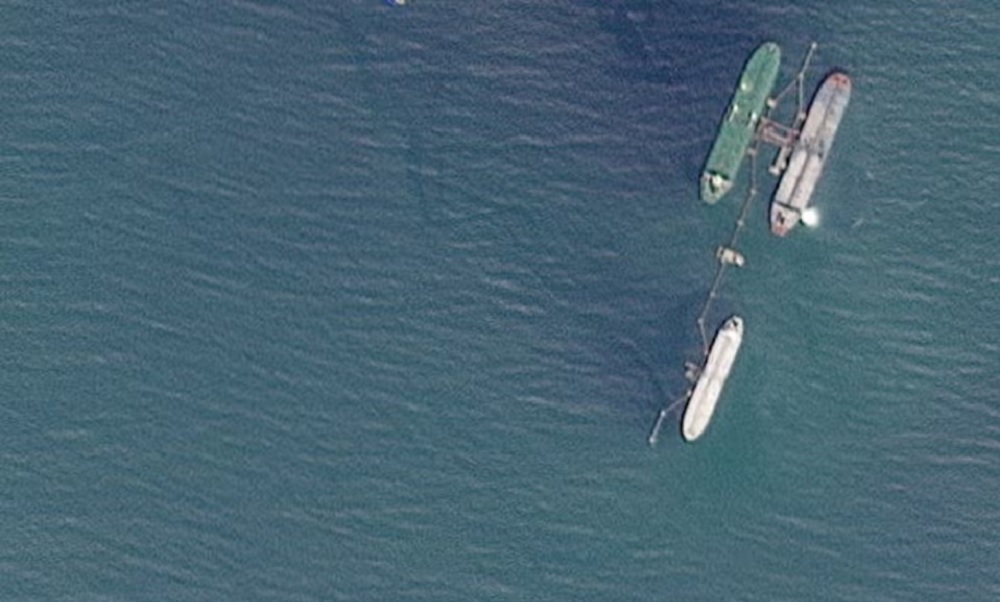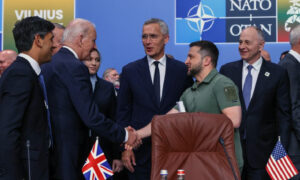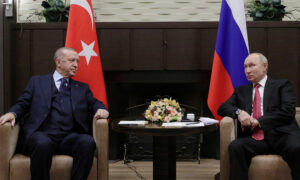World
Biden, Zelenskiy inch toward NATO with 10-year defense agreement
Under the agreement, the United States restates its support for Ukraine’s defense of its sovereignty and territorial integrity, amid a renewed push by Russia on Ukraine’s eastern front.

U.S. President Joe Biden and Ukraine President Volodymyr Zelenskiy signed a 10-year bilateral security agreement on Thursday aimed at bolstering Ukraine’s defense against Russian invaders and getting Ukraine closer to NATO membership, Reuters reported.
The deal, signed on the sidelines of the G7 summit in Italy, aims to commit future U.S. administrations to support Ukraine, even if former President Donald Trump wins November’s election, officials said.
“Our goal is to strengthen Ukraine’s credible defense and deterrence capabilities for the long term,” Biden said at a joint news conference with Zelenskiy.
He said the G7’s message to Russian President Vladimir Putin is “You cannot wait us out. You cannot divide us.” The group of rich nations also agreed to a $50 billion loan for Ukraine backed by profits from frozen Russian assets.
The U.S.-Ukraine security deal is a framework for a long-term effort to help develop Ukraine’s outdated armed forces and serve as a step towards Ukraine’s eventual NATO membership, according to the text.
The Ukraine president called the agreement historic, saying it is a bridge toward his country’s eventual NATO membership. “This is an agreement on security and thus on the protection of human life,” he said.
Zelenskiy has long sought NATO membership but the allies have stopped short of taking that step. The Western alliance regards any attack launched on one of its 32 members as an attack on all under its Article Five clause, read the report.
In the event of an armed attack or threat of such against Ukraine, top U.S. and Ukrainian officials will meet within 24 hours to consult on a response and determine what additional defense needs are required for Ukraine, the agreement says.
Under the agreement, the United States restates its support for Ukraine’s defense of its sovereignty and territorial integrity, amid a renewed push by Russia on Ukraine’s eastern front.
It also outlines plans to develop Ukraine’s own defense industry and expand its military.
Ukraine needs a “significant” military force and sustained investments in its defense industrial base consistent with NATO standards, the text says.
It will allow the two countries to share intelligence, hold training and military education programs and combined military and exercises.
With Trump leading Biden in many election polls, the future of the agreement remains unclear.
Trump has expressed skepticism of Ukraine’s continued fight, saying at one point that he would end the conflict in his first day in office. Trump has also pushed for Europe to take on more of the burden of supporting Kyiv, Reuters reported.
Zelenskiy, asked about what could happen for his country if there is a change in leadership in the United States and in other allied nations, said people stood with Ukraine because they have shared values and empathize with the Ukrainian people.
He said he does not think that popular support will change.
“If the people are with us, any leader will be with us in this struggle for freedom,” he said.
Biden recently shifted his policy against allowing Ukraine to use American weapons for attacks inside Russia, permitting Kyiv to fire long-range U.S. missiles against Russian targets near the embattled Ukrainian city of Kharkiv.
At the news conference, Biden made clear he would not permit Ukraine to expand its use of U.S. missiles inside Russia.
“It makes a lot of sense for Ukraine to be able to take out or combat what is going across that border. In terms of long range weapons … we have not changed our position on that,” Biden said.
Related Stories:
NATO allies offer Ukraine security assurances as Biden hits out at Putin
NATO Allies want to weaken Russia by prolonging Ukraine war: Turkey
World
Venezuela-US tensions spike in wake of seized tanker as Nobel winner vows change

Venezuelan opposition leader Maria Corina Machado on Friday promised political change after slipping out of the country in secret to collect the Nobel Peace Prize, as the shock waves intensified from the Trump administration’s seizure of an oil tanker earlier this week.
That escalation came on the heels of a large-scale U.S. military buildup in the southern Caribbean as President Donald Trump campaigns to oust Venezuelan leader Nicolas Maduro, pushing relations to their most volatile point in years, Reuters reported.
The effects could ripple through the region, with Venezuelan oil exports falling sharply and crisis-stricken Cuba, already straining to power its grid, at risk of losing supply.
The U.S. seizure of the Skipper tanker off Venezuela’s coast on Wednesday marked the first U.S. capture of Venezuelan oil cargo since sanctions were imposed in 2019.
The vessel is now heading to Houston, where it will offload its cargo onto smaller ships, Reuters reported.
The Trump administration does not recognize Maduro, in power since 2013, as Venezuela’s legitimate leader.
Washington has signalled more seizures are planned as part of efforts to choke off sanctioned oil flows, and subsequently imposed new sanctions on three nephews of Maduro’s wife and six tankers linked to them.
The U.S. military presence in the Caribbean has grown as Trump in recent weeks has discussed potential military intervention in Venezuela, based on accusations that the country ships narcotics to the United States. The Venezuelan government has denied the accusations.
So far there have been over 20 U.S. military strikes in the Caribbean and Pacific against suspected drug vessels this year, in which nearly 90 people have been killed, alarming human rights advocates and stirring debate among U.S. lawmakers.
While many Republicans have backed the campaign, Democrats have questioned whether the campaign is illegal and urged more transparency, including the release of a full, unedited video, opens new tab of strikes on a suspected drug-trafficking boat.
MACHADO DEFIES BAN, URGES TRANSITION
Machado defied a decade-long travel ban and a period in hiding to travel to Oslo on Thursday, noting that she would soon bring the Nobel Peace Prize back home to Venezuela.
She said Maduro would leave power “whether there is a negotiated changeover or not,” vowed she is focused on a peaceful transition, and thanked Trump for his “decisive support.”
Machado is aligned with U.S. hardliners who accuse Maduro of ties to criminal networks – claims that U.S. intelligence has reportedly questioned.
When asked at a press conference in Oslo if she believed U.S. intervention was needed in Venezuela, Machado replied, “We are asking the world to help us.”
Venezuela condemned the tanker seizure as “blatant theft” and “international piracy,” saying it would file complaints with international bodies.
At the same time, Venezuelan lawmakers took a step to withdraw the country from the International Criminal Court, which is currently investigating alleged human rights abuses in the South American country.
Adding to the friction, the Venezuelan government announced the suspension of a U.S. migrant repatriation flight on Friday. A U.S. official countered that deportation flights would continue.
World
Putin arrives in Ashgabat to hold series of meetings

Russian President Vladimir Putin has arrived in Turkmenistan’s capital for a two-day visit.
According to TASS, the presidential aircraft of the Rossiya Special Flight Detachment landed near the presidential terminal of Ashgabat International Airport, commonly referred to as the “small bird” for its distinctive design.
During his visit, Putin will attend an international forum titled “Peace and Trust: Unity of Goals for a Sustainable Future” and hold several bilateral meetings.
The Kremlin has confirmed talks with Turkish President Recep Tayyip Erdogan, while the Iranian Embassy has announced that a meeting with President Masoud Pezeshkian is also planned.
The Ashgabat forum will also be attended by Turkmen President Serdar Berdymukhamedov, along with the presidents of Armenia, Iraq, Kazakhstan, Kyrgyzstan, Uzbekistan and Tajikistan, as well as the prime ministers of Azerbaijan, Hungary, Georgia and Pakistan.
World
Trump launches gold card program for expedited visas with a $1 million price tag

President Donald Trump’s administration officially launched his “Trump Gold Card” visa program on Wednesday to provide a pathway, with a steep price, for non-U.S. citizens to get expedited permission to live in the United States.
The website Trumpcard.gov, complete with an “apply now” button, allows interested applicants to pay a $15,000 fee to the Department of Homeland Security for speedy processing, Reuters reported.
After going through a background check or vetting process, applicants must then make a “contribution” — the website also calls it a “gift” — of $1 million to get the visa, similar to a “Green Card,” which allows them to live and work in the United States.
“Basically it’s a Green Card, but much better. Much more powerful, a much stronger path,” Trump told reporters at the White House. “A path is a big deal. Have to be great people.”
Commerce Secretary Howard Lutnick said some 10,000 people have already signed up for the gold card during a pre-registration period and he expected many more to do so. “I would expect over time that we’d sell, you know, thousands of these cards and raise, you know, billions, billions of dollars,” Lutnick told Reuters in a brief interview.
Lutnick said the gold card program would bring people into the United States who would benefit the economy. He compared that to “average” Green Card holders, whom he said earned less money than average Americans and were more likely to be on or have family members on public assistance. He did not provide evidence for that assertion.
Trump’s administration has pursued a broad crackdown on immigration, deporting hundreds of thousands of people who were in the country illegally and also taking measures to discourage legal immigration.
The gold card program is the Trump version of a counter balance to that, designed to make money for the U.S. Treasury in the same way the president, a former New York businessman and reality television host, has said his tariff program has successfully done.
Lutnick noted that there was also a corporate version of the gold card that allowed companies to get expedited visas for employees they wanted to work in the United States, for a $2 million contribution per employee.
-

 Sport4 days ago
Sport4 days agoILT20: Desert Vipers edge Gulf Giants in historic super over thriller
-

 Latest News2 days ago
Latest News2 days agoMuttaqi: Afghanistan’s progress requires both religious and modern education
-

 Regional4 days ago
Regional4 days agoSix Pakistani soldiers killed in TTP attack in Kurram District
-

 Business4 days ago
Business4 days agoTrade bodies warn almost 11,000 Afghan transit containers stuck at Karachi port
-

 World4 days ago
World4 days agoPowerful 7.6 earthquake hits northern Japan, tsunami warnings issued
-

 Latest News3 days ago
Latest News3 days agoTrump calls Afghanistan a ‘hellhole’ country as US expands immigration restrictions
-

 Sport5 days ago
Sport5 days agoSorkh Poshan Khafi defeats Sarsabz Yashlar 4-0 in Afghanistan Champions League
-

 Sport3 days ago
Sport3 days agoCommanding wins for Arman FC and Sarsabz Yashlar in Afghanistan Champions League


























